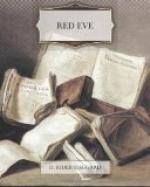“What ails you, lady? You are not well?”
“Oh, I know not. I think it is the heat or some presage of woe to come, not to me only, but to all men. Look, nature herself is sick,” and she led him to the broad balcony of the chamber and pointed to long lines of curious mist which in the bright moonlight they could see creeping toward Venice from the ocean, although what wind there was appeared to be off land.
“Those fogs are unnatural,” she went on. “At this season of the year there should be none, and these come, not from the lagoons, but up from the sea where no such vapours were ever known to rise. The physicians say that they foretell sickness, whereof terrible rumours have for some time past reached us from the East, though none know whether these be true or false.”
“The East is a large place, where there is always sickness, lady, or so I have heard.”
“Ay, ay, it is the home of Death, and I think that he travels to us thence. And not only I, not only I; half the folk in Venice think the same, though why, they cannot tell. Listen.”
As she spoke, the sound of solemn chanting broke upon Hugh’s ear. Nearer it grew, and nearer, till presently there emerged from a side street a procession of black monks who bore in front of them a crucifix of white ivory. Along the narrow margin which lay between the houses and the canal they marched, followed by a great multitude of silent people.
“It is a dirge for the dead that they sing,” said Dame Carleon, “and yet they bury no man. Oh! months ago I would have escaped from this city, and we had leave to go. But then came orders from the King that we must bide here because of his creditors. So here we bide for good and all. Hush! I hear my husband coming; say nothing of my talk, it angers him. Rest you well, Sir Hugh.”
“Truly that lady has a cheerful mind,” grumbled Grey Dick, when she had gone, leaving them alone upon the balcony. “Ten minutes more of her and I think I should go hang myself, or squat upon these stones and howl at the moon like a dog or those whimpering friars.”
Hugh made no answer, for he was thinking of his father’s tale of the prophecies of Sir Andrew Arnold, and how they grew sad in Dunwich also. In truth, like Lady Carleon, he found it in his heart to wish that he too were clear of Venice, which he had reached with so much toil.
“Bah!” he said presently, “this place stinks foully. It puts me in mind of some woman, most beauteous indeed, but three days dead. Let us go in.”
On the following morning, while they sat at breakfast, there came a messenger from the Doge of Venice, whose name Hugh learned was Andrea Dandolo, bearing a letter sealed with a great seal. This letter, when opened, was found to be from some high officer. It stated that the Doge would hold a Court at noon, after which it was his pleasure to receive the English knight who came as a messenger from the mighty monarch, King Edward, and to talk with him on matters set out in the letter of Sir Geoffrey Carleon. The writing added that the Seigneur of Cattrina, who in France was known as the Count de Noyon and in England as Sir Edmund Acour, would be present at the Court and doubtless ready to answer all questions that might be put to him.




